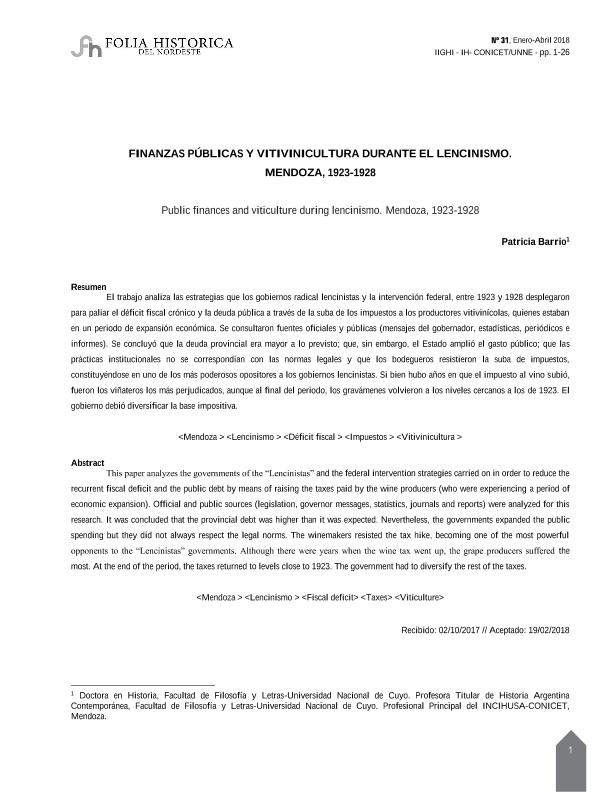Mostrar el registro sencillo del ítem
dc.contributor.author
Barrio, Patricia Elena

dc.date.available
2020-01-03T20:54:27Z
dc.date.issued
2018-01
dc.identifier.citation
Barrio, Patricia Elena; Finanzas públicas y vitivinicultura durante el lencinismo: Mendoza, 1923-1928; Instituto de Investigaciones Geohistóricas; Folia Histórica del Nordeste; 31; 1-2018; 1-26
dc.identifier.issn
0325-8238
dc.identifier.uri
http://hdl.handle.net/11336/93524
dc.description.abstract
El trabajo analiza las estrategias que los gobiernos radical lencinistas y la intervención federal, entre 1923 y 1928 desplegaron para paliar el déficit fiscal crónico y la deuda pública a través de la suba de los impuestos a los productores vitivinícolas, quienes estaban en un periodo de expansión económica. Se consultaron fuentes oficiales y públicas (mensajes del gobernador, estadísticas, periódicos e informes). Se concluyó que la deuda provincial era mayor a lo previsto; que, sin embargo, el Estado amplió el gasto público; que las prácticas institucionales no se correspondían con las normas legales y que los bodegueros resistieron la suba de impuestos, constituyéndose en uno de los más poderosos opositores a los gobiernos lencinistas. Si bien hubo años en que el impuesto al vino subió,fueron los viñateros los más perjudicados, aunque al final del periodo, los gravámenes volvieron a los niveles cercanos a los de 1923. El gobierno debió diversificar la base impositiva.
dc.description.abstract
This paper analyzes the governments of the “Lencinistas” and the federal intervention strategies carried on in order to reduce the recurrent fiscal deficit and the public debt by means of raising the taxes paid by the wine producers (who were experiencing a period of economic expansion). Official and public sources (legislation, governor messages, statistics, journals and reports) were analyzed for this research. It was concluded that the provincial debt was higher than it was expected. Nevertheless, the governments expanded the public spending but they did not always respect the legal norms. The winemakers resisted the tax hike, becoming one of the most powerful opponents to the “Lencinistas” governments. Although there were years when the wine tax went up, the grape producers suffered the most. At the end of the period, the taxes returned to levels close to 1923. The government had to diversify the rest of the taxes.
dc.format
application/pdf
dc.language.iso
spa
dc.publisher
Instituto de Investigaciones Geohistóricas
dc.rights
info:eu-repo/semantics/openAccess
dc.rights.uri
https://creativecommons.org/licenses/by-nc-sa/2.5/ar/
dc.subject
MENDOZA
dc.subject
IMPUESTOS
dc.subject
VITIVINICULTURA
dc.subject
LENCINISMO
dc.subject.classification
Otras Historia y Arqueología

dc.subject.classification
Historia y Arqueología

dc.subject.classification
HUMANIDADES

dc.title
Finanzas públicas y vitivinicultura durante el lencinismo: Mendoza, 1923-1928
dc.title
Public finances and viticulture during lencinismo: Mendoza, 1923-1928
dc.type
info:eu-repo/semantics/article
dc.type
info:ar-repo/semantics/artículo
dc.type
info:eu-repo/semantics/publishedVersion
dc.date.updated
2019-10-22T13:38:02Z
dc.identifier.eissn
2525-1627
dc.journal.number
31
dc.journal.pagination
1-26
dc.journal.pais
Argentina

dc.journal.ciudad
Resistencia
dc.description.fil
Fil: Barrio, Patricia Elena. Universidad Nacional de Cuyo. Facultad de Filosofía y Letras; Argentina. Consejo Nacional de Investigaciones Científicas y Técnicas. Centro Científico Tecnológico Conicet - Mendoza. Instituto de Ciencias Humanas, Sociales y Ambientales; Argentina
dc.journal.title
Folia Histórica del Nordeste
dc.relation.alternativeid
info:eu-repo/semantics/altIdentifier/url/https://revistas.unne.edu.ar/index.php/fhn/article/view/2906
dc.relation.alternativeid
info:eu-repo/semantics/altIdentifier/doi/http://dx.doi.org/10.30972/fhn.0312906
Archivos asociados
